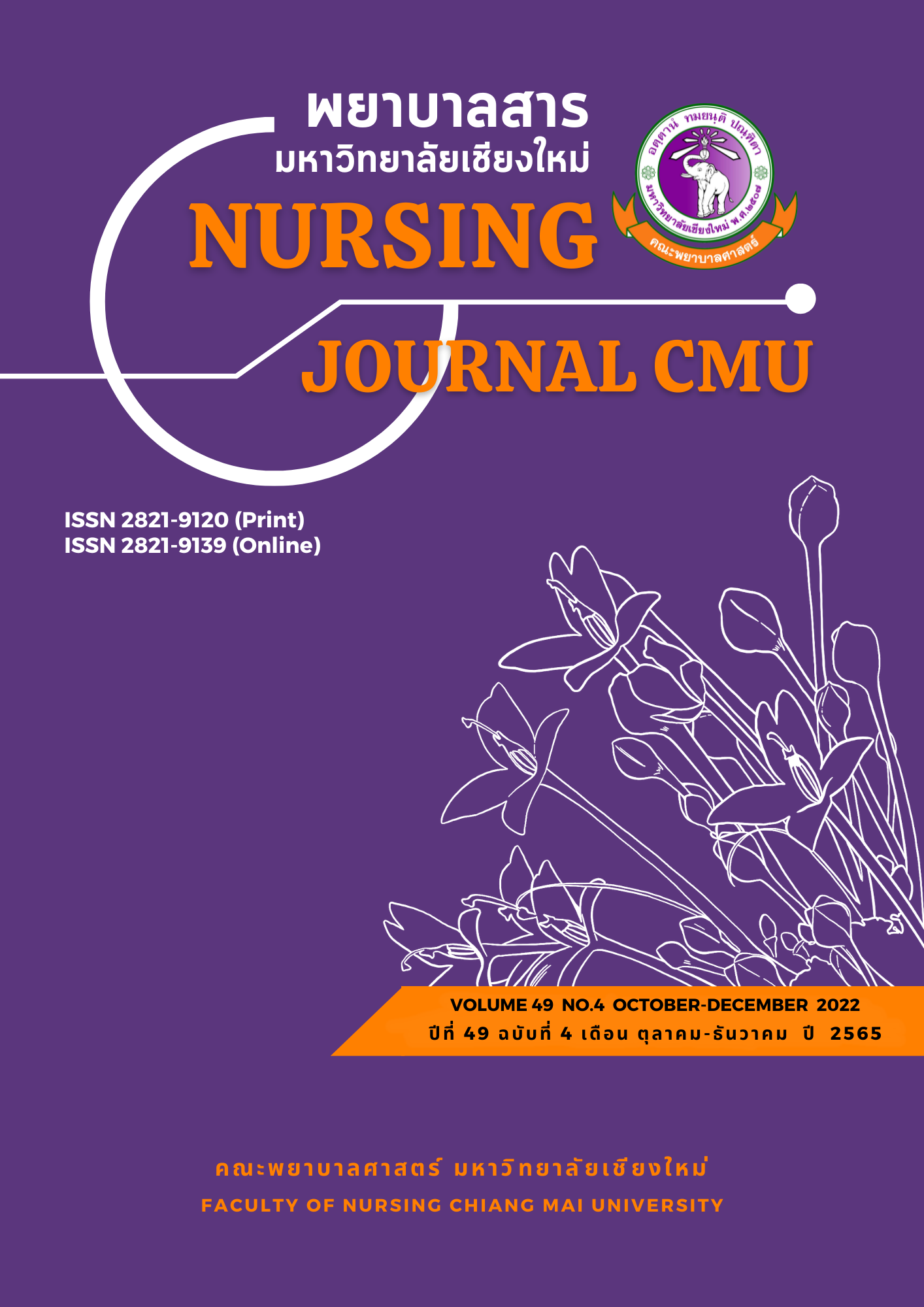Knowledge, Attitudes, and Practices Regarding COVID-19 Management Among Emergency Nurses in Chengdu, the People’s Republic of China
Keywords:
COVID-19 management, Emergency nurses, Knowledge, Father’s attitude, PracticeAbstract
Emergency nurses play significant roles in COVID-19 management. Assessment of knowledge, attitudes, and practices among emergency nurses will provide basic information for enhancing the quality of COVID-19 management in emergency departments. This descriptive correlational research aimed to explore emergency nurses’ knowledge, attitudes, and practices (KAP) regarding COVID-19 management and the relationships between them. The Knowledge-Attitude-Practice (KAP) Model (Schwartz, 1976) and the literature review were used as the study framework. The survey was conducted online with 308 emergency nurses working in hospitals in Chengdu, China. Research instruments included the Demographic Data Form and the KAP Questionnaire developed by the researchers based on the Chinese Infection Prevention and Control Technical Guide in Health Care Settings (third edition) and the literature review. Descriptive statistics and Pearson’s correlation were used for data analysis.
The findings revealed that the participants had a good level of knowledge ( = 16.30, SD = 1.53), positive attitudes ( = 3.57, SD = 0.40), and good practices of COVID-19 management (= 4.76, SD = 0.33). There were statistically significant weak positive correlations between knowledge and attitudes (r = 0.18, p < 0.01), and attitudes and practices (r = 0.33, p < 0.001). There was also a weak positive correlation between knowledge and practices (r = 0.11), but it was not statistically significant.
These findings could be used as basic information for further strengthening COVID-19 management among emergency nurses in China.
References
Abdel Wahed, W. Y., Hefzy, E. M., Ahmed, M. I., & Hamed, N. S. (2020). Assessment of knowledge, attitudes, and perception of health care workers regarding COVID-19, a cross-sectional study from Egypt. Journal of Community Health, 45(6), 1242–1251.
Bekele, F., Sheleme, T., Fekadu, G., & Bekele, K. (2020). Patterns and associated factors of COVID-19 knowledge, attitude, and practice among general population and health care workers: A systematic review. SAGE Open Medicine, 8. doi: 10.1177/2050312120970
Bloom, B. S. (1968). Learning for Mastery. Instruction and curriculum. Regional education laboratory for the Carolinas and Virginia, topical papers and reprints, number 1. Evaluation Comment, 1(2), n2.
Comprehensive Group of Joint Prevention and Control Mechanism of the State Council to Respond to the COVID-19 Epidemic. (2021). Notice on issuing the technical guidelines for the prevention and control of COVID-19 infection in medical institutions (3rd ed.). Retrieved from http://www.gov.cn/xinwen/2021-09/14/content_5637141.htm
Deitrick, K., Adams, J., & Davis, J. (2020). Emergency nursing care of patients with novel coronavirus disease 2019. Journal of Emergency Nursing, 46(6), 748–759.
Fernandez, R., Lord, H., Halcomb, E., Moxham, L., Middleton, R., Alananzeh, I., & Ellwood, L. (2020). Implications for COVID-19: A systematic review of nurses’ experiences of working in acute care hospital settings during a respiratory pandemic. International Journal of Nursing Studies, 111. doi: 10.1016/j.ijnurstu.2020.103637
Jeong, S., & Kim, J. (2022). Factors influencing nurses’ intention to care for patients with
COVID-19: Focusing on positive psychological capital and nursing professionalism. PLOS ONE, 17(1). doi: 10.1371/journal.pone.0262786
Kamacooko, O., Kitonsa, J., Bahemuka, U. M., Kibengo, F. M., Wajja, A., Basajja, V., … Ruzagira, E. (2021). Knowledge, attitudes, and practices regarding COVID-19 among healthcare workers in Uganda: A cross-sectional survey. International Journal of Environmental Research and Public Health, 18(13). doi: 10.3390/ijerph18137004
Kemppainen, V., Tossavainen, K., & Turunen, H. (2013). Nurses’ roles in health promotion practice: An integrative review. Health Promotion International, 28(4), 490–501.
Limbu, D. K., Piryani, R. M., & Sunny, A. K. (2020). Healthcare workers’ knowledge, attitude and practices during the COVID-19 pandemic response in a tertiary care hospital of Nepal. PLOS ONE, 15(11). doi: 10.1371/journal.pone.0242126
Nemati, M., Ebrahimi, B., & Nemati, F. (2020). Assessment of Iranian nurses’ knowledge and anxiety toward COVID-19 during the current outbreak in Iran. Archives of Clinical Infectious Diseases, 15(COVID-19): e102848. doi: 10.5812/archcid.102848
Olum, R., Chekwech, G., Wekha, G., Nassozi, D. R., & Bongomin, F. (2020). Coronavirus disease-2019: Knowledge, attitude, and practices of health care workers at Makerere University teaching hospitals, Uganda. Frontiers in Public Health, 8, 181.
Rastogi, A., Syed, S., Bansal, A., Ramalingam, A., Sharma, T., Kumar, V., … Varshney, M. (2021). Knowledge, attitude, and practice toward prevention and management of COVID-19 among Indian nurses: A cross-sectional study. Journal of Applied Sciences and Clinical Practice, 2(1), 14.
Saqlain, M., Munir, M. M., Rehman, S. U., Gulzar, A., Naz, S., Ahmed, Z., … Mashhood, M. (2020). Knowledge, attitude, practice and perceived barriers among healthcare workers regarding COVID-19: A cross-sectional survey from Pakistan. Journal of Hospital Infection, 105(3), 419–423.
Schrader, P. G., & Lawless, K. A. (2004). The knowledge, attitudes, & behaviors approach how to evaluate performance and learning in complex environments. Performance Improvement, 43(9), 8–15.
Schwartz, N. E. (1976). Nutrition knowledge, attitudes and practices of Canadian public health nurses. Journal of Nutrition Education, 8(1), 28–31.
Wen, X., Wang, F., Li, X., & Gu, H. (2021). Study on the knowledge, attitude, and practice (KAP) of nursing staff and influencing factors on COVID-19. Frontiers in Public Health, 8. doi: 10.3389/fpubh.2020.560606
World Health Organization. (2022). WHO Coronavirus (COVID-19) Dashboard. Retrieved from https://covid19.who.int
Yamane, T. (1967). Statistics: An introductory analysis. New York: Harper & Row.
Zhang, M., Zhou, M., Tang, F., Wang, Y., Nie, H., Zhang, L., & You, G. (2020). Knowledge, attitude, and practice regarding COVID-19 among healthcare workers in Henan, China. The Journal of Hospital Infection, 105(2), 183–187.
Zheng, L., Chen, K., & Ma, L. (2021). Knowledge, attitudes, and practices toward COVID-19 among construction industry practitioners in China. Frontiers in Public Health, 8. doi: 10.3389/fpubh.2020.599769
Downloads
Published
How to Cite
Issue
Section
License
Copyright (c) 2022 Nursing Journal

This work is licensed under a Creative Commons Attribution-NonCommercial-NoDerivatives 4.0 International License.
บทความที่ได้รับการตีพิมพ์เป็นลิขสิทธิ์ของวารสารพยาบาลสาร
ข้อความที่ปรากฏในบทความแต่ละเรื่องในวารสารวิชาการเล่มนี้เป็นความคิดเห็นส่วนตัวของผู้เขียนแต่ละท่านไม่เกี่ยวข้องกับมหาวิทยาลัยเชียงใหม่ และคณาจารย์ท่านอื่นๆในมหาวิทยาลัยฯ แต่อย่างใด ความรับผิดชอบองค์ประกอบทั้งหมดของบทความแต่ละเรื่องเป็นของผู้เขียนแต่ละท่าน หากมีความผิดพลาดใด ๆ ผู้เขียนแต่ละท่านจะรับผิดชอบบทความของตนเองแต่ผู้เดียว






